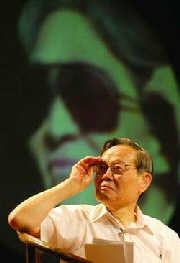 Great Contributions
Great Contributions
Since from almost his earliest days as a physicist, Yang Zhenning has made significant contributions to the theory of the weak interactions--the forces long thought to cause elementary particles to disintegrate.
By 1953 it was recognized that there was a fundamental paradox in this field since one of the newly discovered mesons--the so-called K meson--seemed to exhibit decay modes into configurations of differing parity. Since it was believed that parity had to be conserved, this led to a severe paradox.
After exploring every conceivable alternative, Li Zhengdao and Yang Zhenning were forced to examine the experimental foundations of parity conservation itself. In early 1956, they discovered that, contrary to what had been assumed, there was no experimental evidence against parity non-conservation in the weak interactions. The experiments that had been done, it turned out, simply had no bearing on the question.
They suggested a set of experiments that would settle the matter, and, when these experiments were carried out by several groups of people over the next year, large parity-violating effects were discovered. In addition, the experiments also showed that the symmetry between particle and antiparticle, known as charge conjugation symmetry, is also broken by the weak decays.
In addition to his work on weak interactions, Yang Zhenning, in collaboration with Li Zhengdao and others, carried out important work in statistical mechanics -- the study of systems with large numbers of particles -- and later investigated the nature of elementary particle reactions at extremely high energies.
Starting from 1965, Yang Zhenning was the Albert Einstein professor at the Institute of Science, State University of New York at Stony Brook, Long Island. During the 1970s he was a member of the board of Rockefeller University and the American Association for the Advancement of Science respectively, and from 1978, of the Salk Institute for Biological Studies, in San Diego, California.
He was also on the board of Ben-Gurion University, in Beersheba, Israel. He received the Einstein Award in 1957 and the Rumford Prize in 1980. In 1986 he received the Liberty Award and the National Medal of Science.
